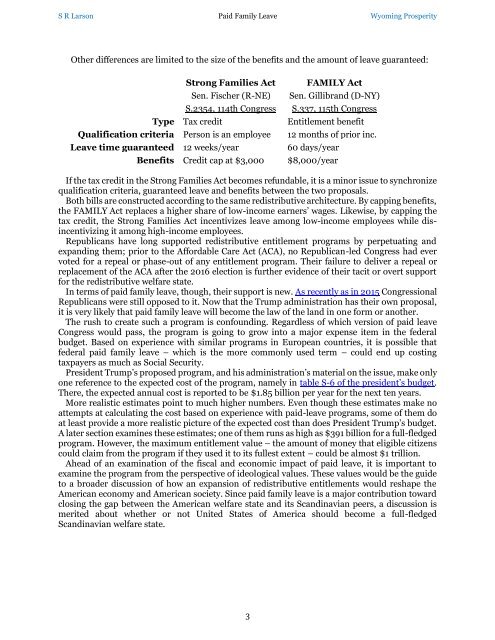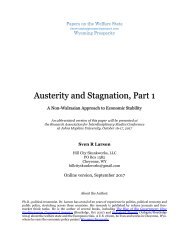Welfare State Paper 1 Paid Family Leave copy
Create successful ePaper yourself
Turn your PDF publications into a flip-book with our unique Google optimized e-Paper software.
S R Larson <strong>Paid</strong> <strong>Family</strong> <strong>Leave</strong> Wyoming Prosperity<br />
Other differences are limited to the size of the benefits and the amount of leave guaranteed:<br />
Strong Families Act<br />
Sen. Fischer (R-NE)<br />
S.2354, 114th Congress<br />
Type Tax credit<br />
Qualification criteria Person is an employee<br />
<strong>Leave</strong> time guaranteed 12 weeks/year<br />
Benefits Credit cap at $3,000<br />
FAMILY Act<br />
Sen. Gillibrand (D-NY)<br />
S.337, 115th Congress<br />
Entitlement benefit<br />
12 months of prior inc.<br />
60 days/year<br />
$8,000/year<br />
If the tax credit in the Strong Families Act becomes refundable, it is a minor issue to synchronize<br />
qualification criteria, guaranteed leave and benefits between the two proposals.<br />
Both bills are constructed according to the same redistributive architecture. By capping benefits,<br />
the FAMILY Act replaces a higher share of low-income earners’ wages. Likewise, by capping the<br />
tax credit, the Strong Families Act incentivizes leave among low-income employees while disincentivizing<br />
it among high-income employees.<br />
Republicans have long supported redistributive entitlement programs by perpetuating and<br />
expanding them; prior to the Affordable Care Act (ACA), no Republican-led Congress had ever<br />
voted for a repeal or phase-out of any entitlement program. Their failure to deliver a repeal or<br />
replacement of the ACA after the 2016 election is further evidence of their tacit or overt support<br />
for the redistributive welfare state.<br />
In terms of paid family leave, though, their support is new. As recently as in 2015 Congressional<br />
Republicans were still opposed to it. Now that the Trump administration has their own proposal,<br />
it is very likely that paid family leave will become the law of the land in one form or another.<br />
The rush to create such a program is confounding. Regardless of which version of paid leave<br />
Congress would pass, the program is going to grow into a major expense item in the federal<br />
budget. Based on experience with similar programs in European countries, it is possible that<br />
federal paid family leave – which is the more commonly used term – could end up costing<br />
taxpayers as much as Social Security.<br />
President Trump’s proposed program, and his administration’s material on the issue, make only<br />
one reference to the expected cost of the program, namely in table S-6 of the president’s budget.<br />
There, the expected annual cost is reported to be $1.85 billion per year for the next ten years.<br />
More realistic estimates point to much higher numbers. Even though these estimates make no<br />
attempts at calculating the cost based on experience with paid-leave programs, some of them do<br />
at least provide a more realistic picture of the expected cost than does President Trump’s budget.<br />
A later section examines these estimates; one of them runs as high as $391 billion for a full-fledged<br />
program. However, the maximum entitlement value – the amount of money that eligible citizens<br />
could claim from the program if they used it to its fullest extent – could be almost $1 trillion.<br />
Ahead of an examination of the fiscal and economic impact of paid leave, it is important to<br />
examine the program from the perspective of ideological values. These values would be the guide<br />
to a broader discussion of how an expansion of redistributive entitlements would reshape the<br />
American economy and American society. Since paid family leave is a major contribution toward<br />
closing the gap between the American welfare state and its Scandinavian peers, a discussion is<br />
merited about whether or not United <strong>State</strong>s of America should become a full-fledged<br />
Scandinavian welfare state.<br />
3



